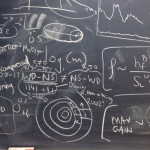Causality and Radioactive Decay
by Dr. Edward Feser
Filed under Science
NOTE: Today we finish our two part series by Dr. Edward Feser exploring questions about science, philosophy, causality, and radioactive decay. You can read the first part here.
Now, if there must be causality at the macro level (at the very least in the case of the causal relations between the external world and our perceptual experiences of it), and this causality is not captured in the description of the world that physics itself gives us, then it follows that there is more to causality than physics can tell us. And even if you dispute the views of Russell, Putnam, Merricks, et al., physics itself is not going to settle the matter. For it is not an empirical matter, but a philosophical dispute about how to interpret the empirical evidence.
(Nor will it do to dismiss such disputes on the grounds that the competing views about them are “unfalsifiable.” This is known as falsificationism, a thesis put forward by a philosopher, Karl Popper. As Popper himself realized, falsificationism is not itself a scientific thesis but a meta-level claim about science.)
If physics in general raises philosophical questions it cannot answer, the same is even more clearly true of quantum mechanics in particular. Feynman’s famous remark that nobody understands quantum mechanics is an overstatement, but it is certainly by no means obvious how to interpret some of the theory’s stranger aspects. Quantum mechanics has been claimed to “show” all sorts of things—that the law of excluded middle is false, that scientific realism is false, that idealism is true, etc. By itself it shows none of these things. In each case, certain philosophical assumptions are first read into quantum mechanics and then read out again. But the same thing is true of claims to the effect that quantum mechanics undermines causality. By itself it does not, and could not, show such a thing either. Here as in the other cases, it is the metaphysical background assumptions we bring to bear on quantum mechanics that determine how we interpret it. This is as true of philosophical naturalists, atheists, et al. as it is of Scholastics.
Now, the Scholastic metaphysician argues, on grounds entirely independent of questions about how to interpret quantum mechanics, that there are a number of metaphysical theses that any possible empirical science is going to have to presuppose. Most fundamentally, there is the Aristotelian theory of act and potency, according to which we cannot make sense of change as a real feature of the world unless we recognize that there is, in addition to what is actual on the one hand, and sheer nothingness on the other, a middle ground of potentiality. Change is the actualization of a potentiality, and unless we affirm this we will be stuck with a static Parmenidean conception of the world. And that is not an option, because the existence of change cannot coherently be denied. Even to work through the steps of an argument for the non-existence of change is itself an instance of change. Sensory experience—and thus the observation and experiment on which empirical science rests—presupposes real change. (Hence it is incoherent to suggest, as is sometimes done, that relativity shows that change is illusory, since the evidence for relativity presupposes sensory experience and thus change.)
Now, the main concepts of the Aristotelian-Scholastic metaphysical apparatus—substantial form and prime matter, final causality and efficient causality, and so forth—are essentially an outworking of the theory of act and potency. You can argue about whether this or that object truly has a substantial form or is merely an aggregate, about whether we have correctly identified and characterized the teleological features of such-and-such a natural process, and so on. What cannot be denied is that substantial form, teleology, etc. are bedrock features of the natural order and will inevitably feature in a complete picture of the physical world at some level of analysis. All of that follows from a consistent application of the theory of act and potency. It also cannot be denied that any potential that is actualized is actualized by something already actual. That is the core of the “principle of causality,” and it follows from the principle of sufficient reason—a principle which, rightly understood, also cannot coherently be denied.
I spell out the reasons for all of this in detail, and also discuss the inherent limitations of empirical science, in Scholastic Metaphysics. The point to emphasize for present purposes is that the Scholastic holds that there a number of general metaphysical truths which we can know completely independently of particular disputes within physics or any other empirical science, precisely because they rest on what any possible empirical science must itself presuppose. (One of Cruz-Uribe’s readers insinuates that in resting its key theses on something other than empirical science, Scholastic metaphysics undermines the possibility of any common ground with its critics. But this is precisely the reverse of the truth and once again completely misses the point. Since Scholastic metaphysical arguments begin with what empirical science presupposes—for example, the possibility of sensory experience, and the possibility of at least partial explanations—they thereby begin precisely with what the critics already accept, not with what they reject.)
Radioactive Decay
So, here is where we are before we even get to the issue of radioactive decay: Purportedly physics-based objections to Scholastic metaphysics—including objections to Scholastic claims about causality—are, as a matter of course, poorly thought out. They commonly blur the distinction between empirical and philosophical claims, confuse what is really only one notion of causality with causality as such, and confuse mere illustrations or applications of general metaphysical principles with the principles themselves. Meanwhile, we know on independent grounds that physics, of its very nature, cannot in principle tell us everything there is to know about physical reality, including especially the causal features of physical reality. Its exclusively mathematical conceptual apparatus necessarily leaves out whatever cannot be captured in quantitative terms. Physics also implies that there must be something more to physical reality than what it captures, since mathematical structure is of itself a mere abstraction and there must be some concrete reality which has the structure.
We also know that quantum mechanics in particular raises all sorts of puzzling metaphysical questions (not merely about causality) that it cannot answer. And, the Scholastic argues, we know on independent grounds—grounds that any possible empirical science must presuppose—that there are a number of metaphysical truths that we must bring to bear on our understanding of the world whatever the specific empirical facts turn out to be, including the truth that causality must be a real feature of the world.
So, when critics glibly allege that radioactive decay or other quantum phenomena undermine causality, the trouble is that they are making a charge which requires defense. It is preposterous to pretend that the burden of proof is on the Scholastic to show that quantum mechanics is compatible with Scholastic claims about causality. The burden of proof is rather on the critic to show that there really is any incompatibility. (Few people would claim that the burden of proof is on anyone to prove that quantum mechanics doesn’t establish idealism, or doesn’t undermine the law of excluded middle, or doesn’t refute scientific realism. It is generally realized that the claims in question here are very large ones that go well beyond anything quantum mechanics itself can be said to establish, so that the burden of proof is on anyone who wants to claim quantum mechanics has such sweeping implications. So why is the burden of proof on the Scholastic to show that quantum mechanics doesn’t undermine causality?)
In particular, the critic owes us an account of why, since physics cannot in principle capture all there is to physical reality in the first place—and in particular arguably fails entirely (as Russell held) to capture causality in general—we should regard it as especially noteworthy if it fails to capture causality in one particular case. If the critic, like the early Russell, denies that there is any causality at all, he owes us an account of how he can coherently take such a position, and in particular how he can account for our knowledge of the world physics tells us about if we have no causal contact with it. If the critic says instead that genuine causality does exist in some parts of nature but not in the particular cases he thinks quantum mechanics casts doubt on, he owes us an account of why we should draw the line where he says we should, and how there could be such a line. (As I noted recently with respect to the Principle of Sufficient Reason, it is difficult to see how it could be coherent to think that things are in principle explicable in some cases while denying that they are in general explicable in principle. Yet to affirm the principle of causality in some cases and deny it in others seems similarly incoherent.)
In short, anyone who claims that quantum mechanics undermines Scholastic metaphysical claims about causality owes us an alternative worked-out metaphysical picture before we should take him seriously (just as anyone who would claim that quantum mechanics undermines the law of excluded middle owes us an alternative system of logic if we are to take him seriously). And if he gives us one, it would really be that metaphysical system itself, rather than quantum mechanics per se, that is doing the heavy lifting.
Now, no one expects a logician to launch into a mini treatise on quantum mechanics before setting forth a textbook exposition of classical logic, law of excluded middle and all. The reason is that it is widely understood that it is just false to say flatly that “Quantum mechanics has undermined classical logic.” Quantum mechanics has done no such thing. Rather, some people have been led by their metaphysical speculations about quantum mechanics to wonder whether logic might be rewritten without the law of excluded middle. Logicians who have independent grounds to think that the law of excluded middle cannot be false have no reason to take these speculations very seriously or respond in detail to them when going about their ordinary work.
Similarly, there is no reason why a Scholastic metaphysician should be expected to launch into a detailed discussion of quantum mechanics before deploying the principle of causality in a general metaphysical context, or when giving an argument for the existence of God. For it is also simply false to say that “Quantum mechanics has undermined the principle of causality.” It has done no such thing. The most that one can say is that some people have been led by their metaphysical speculations about quantum mechanics to wonder whether metaphysics might be rewritten in a way that does without the principle of causality. But metaphysicians who have independent grounds to think that the principle of causality cannot be false have no reason to take these speculations very seriously or to respond in detail to them when going about their ordinary work.
Of course, logicians have examined proposed non-classical systems of logic, and classical logicians have put forward criticisms of these alternative systems. The point is that their doing so is not a prerequisite of their being rationally justified in using classical logic. Similarly, a Scholastic metaphysician, especially if he is interested in questions about philosophy of nature and philosophy of physics, can and should address questions about how to interpret various puzzling aspects of quantum mechanics. But the point is that doing so is not a prerequisite to his being rationally justified in appealing to the principle of causality in general metaphysics or in presenting a First Cause argument for the existence of God.
But how might a Scholastic interpret phenomena like radioactive decay? I hinted at one possible approach in the post on Oerter linked to above, an approach which is suggested by the way some Scholastic philosophers have thought about local motion. Some of these thinkers, and Aquinas in particular, take the view that a substance can manifest certain dispositions in a “spontaneous” way in the sense that these manifestations simply follow from its nature or substantial form. A thing’s natural tendencies vis-à-vis local motion would be an example. These motions simply follow from the thing’s substantial form and do not require a continuously conjoined external mover. Now, that is not to say that the motion in question does not have an efficient cause. But the efficient cause is just whatever generated the substance and thus gave it the substantial form that accounts (qua formal cause) for its natural local motion. (It is commonly but erroneously thought that medieval Aristotelians in general thought that all local motion as such required a continuously conjoined cause. In fact that was true only of some of these thinkers, not all of them. For detailed discussion of this issue, see James Weisheipl’s book Nature and Motion in the Middle Ages, from which I borrow the language of “spontaneity.” I also discuss these issues in more detail here.)
Now, Aquinas himself elaborated on this idea in conjunction with the thesis that the “natural place” toward which heavy objects are inclined to move is the center of the earth, and he supposed also that projectile motions required a conjoined mover insofar as he regarded them as “violent” rather than natural. Both of these suppositions are outmoded, but the more general thesis summarized in the preceding paragraph is logically independent of them and can easily be disentangled from them. One can consistently affirm (a) that a substance will tend toward a certain kind of local motion simply because of its substantial form, while rejecting the claim that (b) this local motion involves movement toward a certain specific place, such as the center of the earth.
Indeed, some contemporary Aristotelians have proposed that affirming (a) while rejecting (b) is the right way to think about inertial motion: Newton’s principle of inertia, on this view, is a description of the way a physical object will tend to behave vis-à-vis local motion given its nature or substantial form. (Again, see this article for discussion of the relevant literature.) The point for present purposes, though, is that the idea just described also provides a model—I don’t say it is the only model, just a model—for understanding what is going on metaphysically with phenomena like radioactive decay.
The idea would be this. Let’s borrow an example from philosopher of science Phil Dowe’s book, Physical Causation, since I’ll have reason to return to the use he makes of it in a moment. Dowe writes:
"Suppose that we have an unstable lead atom, say Pb210. Such an atom may decay, without outside interference, by α-decay into the mercury atom Hg206. Suppose the probability that the atom will decay in the next minute is x. Then
P(E|C) = x
where C is the existence of the lead atom at a certain time t1, and E is the production of the mercury atom within the minute immediately following t1." (pp. 22-23)
Now, applying the conceptual apparatus borrowed from Aquinas (which, I should add, Dowe himself does not do), we can say that the decay in question is “spontaneous” in something like the way Aquinas thought the natural local motion of a physical substance is “spontaneous.” In particular, given the nature or substantial form of Pb210, there is a probability of x that it will decay in the next minute. The probability is not unintelligible, but grounded in what it is to be Pb210 . The decay thus has a cause in the sense that (i) it has a formal cause in the nature or substantial form of the particular Pb210 atom, and (ii) it has an efficient cause in whatever it was that originally generated that Pb210 atom (whenever that was).
It is worth noting that you don’t need to be a Scholastic to think that there really is causation in cases like this, which brings me to Dowe’s own use of this example. As Dowe notes, even if it is claimed that decay phenomena are incompatible with deterministic causality, it doesn’t follow that there is no causality at all in such cases. All that would follow is that the causality is not deterministic. In defense of the claim that there is causality of at least an indeterministic sort in cases like the one he cites, he writes:
"If I bring a bucket of Pb210 into the room, and you get radiation sickness, then doubtless I am responsible for your ailment. But in this type of case, I cannot be morally responsible for an action for which I am not causally responsible. Now the causal chain linking my action and your sickness involves a connection constituted by numerous connections like the one just described. Thus the insistence that C does not cause E on the grounds that there’s no deterministic link entails that I am not morally responsible for your sickness. Which is sick." (p. 23)
Dowe also points out that “scientists describe such cases of decay as instances of production of Hg206… [and] ‘production’ is a near-synonym for ‘causation’” (p. 23). This sounds paradoxical only if we fallaciously conflate deterministic causality and causality as such.
Interestingly, elsewhere in his book, Dowe argues that Newton’s first law should be interpreted as entailing, not that a body’s uniform motion has no cause, but rather that its inertia, conceived of as a property of a body, is its cause (pp. 53-54). This dovetails with the analysis of inertial motion given by some contemporary Aristotelians, to which I alluded above. John Losee, in his book Theories of Causality, discusses Dowe’s views and notes the parallel between what Dowe says about radioactive decay and what he says about inertia (p. 126). The parallel, I would say (using notions neither Dowe nor Losee appeal to), is this: In both cases, Dowe is describing the way a thing will “spontaneously” tend to behave given its nature or substantial form (albeit the manifestation of the tendency is probabilistic in the case of Pb210 but not in the case of inertial motion).
So, Dowe’s views seem to some extent to recapitulate the elements of the Aquinas-inspired account of radioactive decay sketched above, which I earlier put forward in the post replying to Oerter. It is worth emphasizing that neither Dowe nor Losee has any Scholastic ax to grind, and that I came across their work long after writing that post—so as to forestall any objection to the effect that the proposed account is somehow a merely ad hoc way to try to get round the objection from radioactive decay (an objection that would be absurd in any case given that the basic concepts made use of in the proposed account are centuries old). On the contrary, it is an account that someone could accept whatever his views about Scholastic metaphysics in general, or about the application of the principle of causality to arguments for God’s existence.
In any event, as I have said, the burden of proof is not on the Scholastic metaphysician to provide an account of how radioactive decay can be reconciled with the principle of causality, because claims to the effect that there is an incompatibility are not even well-motivated in the first place. The burden of proof is rather on the critic of Scholastic metaphysics to develop an alternative metaphysical framework on which the rejection of the principle of causality is defensible, and within which the critic might embed his favored interpretation of quantum mechanics. But that is not very likely. For the Scholastic has grounds entirely independent of issues about quantum mechanics or radioactive decay to conclude that no such alternative metaphysics is forthcoming.
Related Posts
Note: Our goal is to cultivate serious and respectful dialogue. While it's OK to disagree—even encouraged!—any snarky, offensive, or off-topic comments will be deleted. Before commenting please read the Commenting Rules and Tips. If you're having trouble commenting, read the Commenting Instructions.













